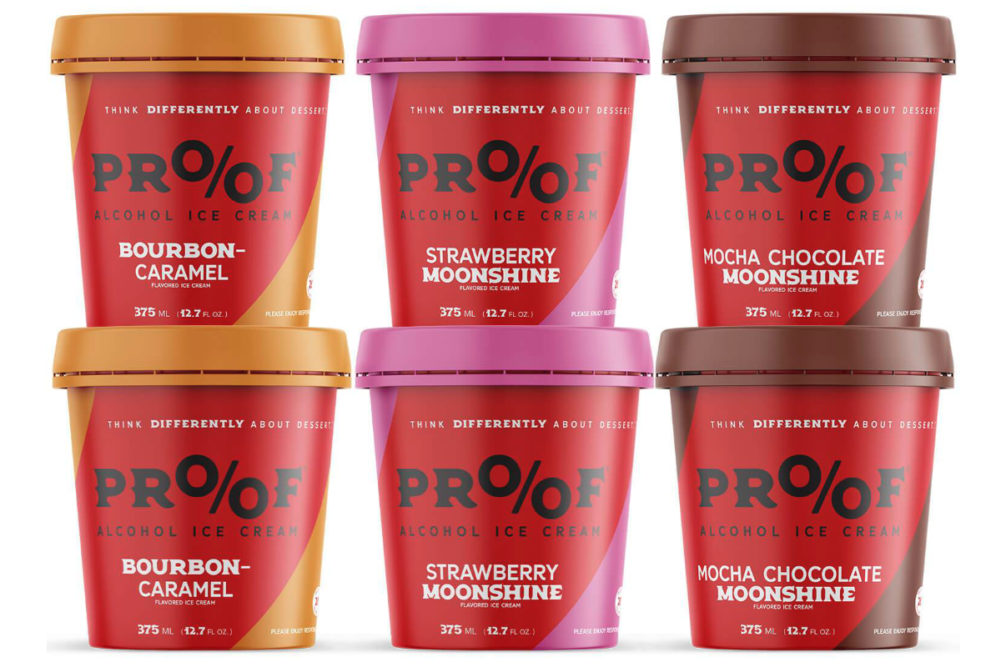COLUMBIA, SC. — Kentucky native Jennifer Randall-Collins in 2015 launched Liquorem Holdings, maker of Proof Alcohol Ice Cream, after getting her hands on an old family recipe for bourbon ice cream.
“In Kentucky, bourbon goes into everything,” Ms. Randall-Collins said. “They put it in all kinds of food. I swear, they even put bourbon in their bourbon.”
Despite her roots in the Bluegrass state, she headed to South Carolina (where the regulatory environment allows for the combination of food and alcohol in one product) to launch a proof of concept. It started with taste tests in local bars and eateries.
“The first thing out of people’s mouth was, ‘Oh my God, where can I buy this?’” she said. “Initially, I was thinking on-premises in bars and restaurants, but the big response from people was that they wanted to buy it at retail.”
The first iteration launched in stores five years ago. The combination of classic ice cream flavors with bourbon, rum or moonshine caught on quick, and three years later Ms. Randall-Collins and her business partner Dirk Brown bought out their prior investors. They came back to market under the Proof Alcohol Ice Cream brand with the vision of expanding across the country and internationally.
The company currently is in more than 200 stores throughout North Carolina, South Carolina and Florida, and is gearing up to ship internationally in South and Central America. Proof is sold in liquor stores and grocery stores, as well as online through the Touch of Modern e-commerce platform and a new direct-to-consumer website.
“One of the biggest things that fuels our success is getting the spoon in a consumer’s mouth,” Ms. Randall-Collins said. “Once we get them to taste it, there's returning revenue.”
The brand offers three permanent flavors, mocha chocolate moonshine, strawberry moonshine and bourbon caramel, along with a rotating selection of seasonal flavors. This summer saw the launch of coconut rum and cheesecake moonshine varieties. In September the company introduced pumpkin spice and apple pie moonshine, followed by pistachio rum, bourbon chocolate cherry and peppermint moonshine in November.
“Keeping that rotation and keeping the menu fresh and relevant to the seasons has been very helpful for us,” Ms. Randall-Collins said.
All the flavors are 7% alcohol by volume (ABV), making each serving akin to a high gravity craft beer.
“We've tried anything from 2% ABV all the way up to 25% ABV, which is just too strong,” Ms. Randall-Collins said. “We’re not trying to get anybody hammered. It's not about getting wasted on ice cream. We tried a couple iterations, one at 10% alcohol by volume, another at 7% and even a few at 5%. The most palate pleasing across the board was that 7% ABV, where you taste the product and get this explosion of flavors. With the pumpkin spice, for instance, you get a strong taste of nutmeg and then a warm finish with the alcohol on the back of the palate.”
The relatively high alcohol content helps Proof stand out in the emerging alcohol ice cream category.
“When I brought it to market in 2015, to my knowledge and to our intellectual property attorney’s knowledge, there was nobody in the space at the retail market,” Ms. Randall-Collins said. “There were folks that were doing what I would call ‘infused ice cream,’ where it’s more of a flavor and not an actual appreciable amount of alcohol.”
Nestle’s Häagen Dazs, for example, offers alcohol ice cream under its Spirits Collection line. The products are made with ingredients like whiskey and rosé wine but are less than 1% ABV.
“We are distinctly different,” Ms. Randall-Collins said. “Alcohol is not a main ingredient like it is in our products. We have had some folks follow us into the market and try to imitate us, which is very flattering and it's good market validation.”
While Proof already was accelerating before the coronavirus (COVID-19) pandemic hit, demand spiked this year as more consumers sought new ways to indulge and unwind at home.
“We make no bones about it, this is not a low calorie or high protein ice cream,” Ms. Randall-Collins said. “This is about treating yourself as an adult. When you've had a long day, we’re going to go all out and give you a product that you can enjoy and indulge in. It is an extra treat, and folks deserve that with everything that is going on. The only thing that slowed us is that grocery store rollouts have been a bit delayed.”
Self-manufacturing has helped the company keep up with demand, she added, even as new opportunities continue opening up across the country and internationally.
“We're trying to have a controlled growth,” Ms. Randall-Collins said. “The last three months have all been about planning and building out as we scale our manufacturing process, so that we make sure the quality is consistent and that the growth of the company scales with the consumer demand. We’re evaluating expansion opportunities and making very surgical decisions to get the best placement, because as we all know, retail is very competitive.”
The company currently is focused on expanding its distribution to the Midwest and West Coast. Long term, Ms. Randall-Collins’ goal is to build a brand that will stand the test of time.
“We’re certainly building for the future with an eye on an opportunity for an exit,” she said. “There definitely is a business piece here where someone, whether it’s on the alcohol side or the ice cream side, eventually comes and takes this to the next level.”

